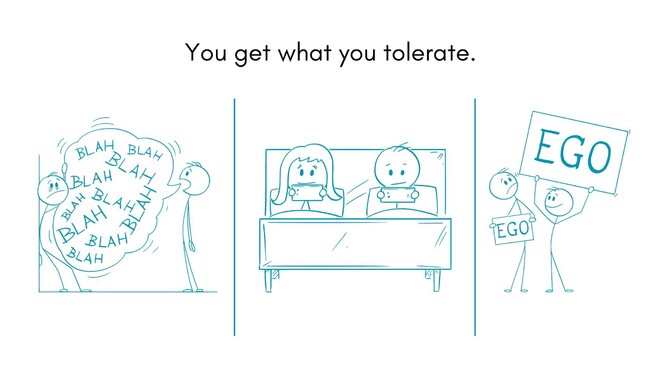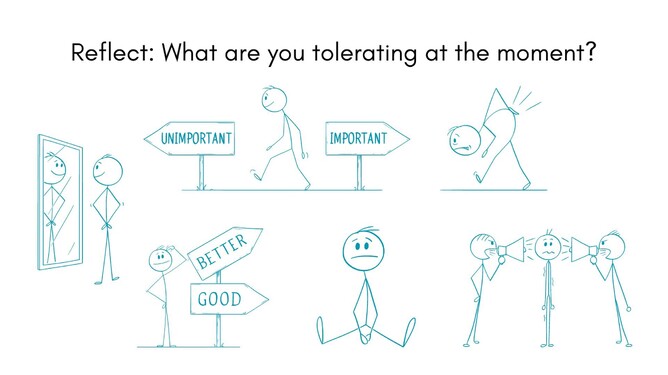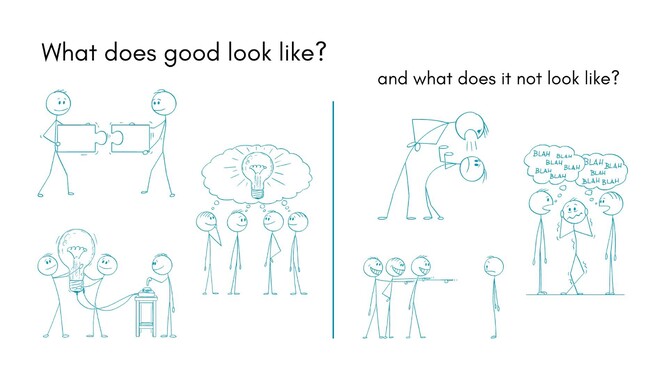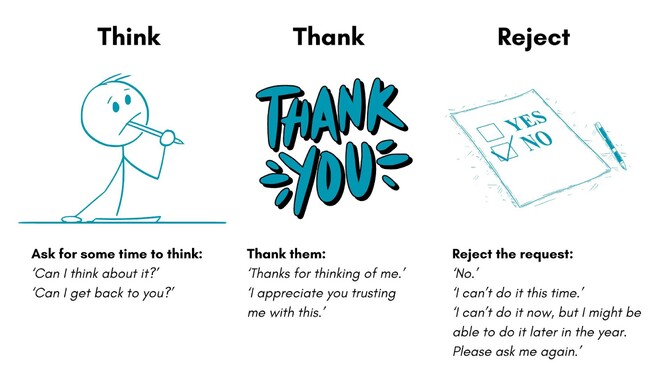I like language. I like playing with it. I enjoy playing with words, with sounds and with repetition. I like dad jokes. And I like it when language is simple. One of my favourite things is short phrases that capture the essence of a concept or an idea. Phrases like, ‘The Conversation is the Relationship’, ‘Structure creates Freedom’ (more on that soon), or the phrase I want to write about today: ‘You get what you tolerate.’
To me, these phrases capture the core of an idea or concept. This doesn’t mean they are perfect. Some still require explanation because the simple phrase is perhaps not enough to capture the complexities. What the phrases do for me though, is they remind me of the essence of the idea. They are brief enough to use them as a quick reflection prompt.
‘You get what you tolerate^’ is one of those reflection opportunities.
We all tolerate things all the time: A flatmate who never seems to be doing their share of the chores. A colleague who talks loudly and habitually takes phone calls in the open-plan office. A partner who overlooks the contributions you make to the joint living experience. A friend wants to talk about how they are and what is happening in their life but never asks you how you are. A sibling who only ever rings you when they need something. A neighbour who regularly takes your parking spot. The list goes on…
And you go along with it. And, guess what, it repeats. Their behaviour stays the same. (And so does yours. And mine.)
We get what we tolerate.
Sometimes I find myself listening to people or observing behaviour and I think, ‘That’s not ok!’ or ‘That doesn’t sit well with me.’ And if I am present enough, I ask myself, ‘Do I feel strongly enough about it to say something here?’ It might be the smallest things: someone pushing in line, people sharing personal information of others to elicit group laughter, people leaving shared areas messy, people pushing banter just that little bit too far, … the list is endless. Am I happy to let this one slide? What does that mean for next time?
You get what you tolerate.
Simple.
Not easy.
We use particular phrases that tell us that we are tolerating things we don't want to tolerate. Here is a small selection:
‘Things have always been this way.’
‘We/They don’t know any different.’
‘That’s just them.’
‘They have always been like that.’
…
If you hear any of those sentences (or if you find yourself saying them), ask yourself, ‘For how long has this been accepted?’ and ‘Can I continue to tolerate it?’
Look at it closely and you'll see that we are complicit in creating and reinforcing the behaviours and situations we don’t like but continue to tolerate. By saying nothing, laughing along, and repeating it, we contribute. We are part of it, we help recreate it over and over again. And I think that this short little phrase captures all of that perfectly:
You get what you tolerate.
We get what we tolerate.
There is another phrase that is close to this one: Everything you are not changing, you are choosing. For example, if, as a team, we tolerate people talking behind each other’s backs, then that is what we will get. If you tolerate it, you are also accepting and supporting it. Don’t be surprised if people talk about you behind your back. It snowballs. What is ok for one becomes ok for everyone. So ask, ‘Would I like it if everyone did this?’
Now, to clarify, I know that there are some things that we can’t change easily, or at least we can’t change or influence quickly, because they are part of bigger societal issues or because meeting other needs is more important. For example, there may be things you don't like about your job, but because you need the money to support yourself and to feel safe and secure, you tolerate them. Fair. I’m not suggesting you quit your job (at least not immediately). But nothing stops you from looking into what is within your control or influence to change.
It’s more about remembering the choices and the influence we do have to shape our relationships and the environments we are part of in ways that align with what we value, individually and collectively. And I’m inviting you to reflect, become aware and be deliberate about what you will tolerate going forward and what you won’t. Start small. Create a ripple effect.
Once you start looking for things you (and others) tolerate and once you become aware, you will start to see it everywhere. Sorry! (Not sorry!)
Noticing is the first step. It is a useful bit of reflection because it makes you think, ‘Oh, I like that’, or ‘I’m ok with that.’ or ‘Mhh, I don’t really like that.’, and ‘I’m not sure I want to tolerate that.’
This is your opportunity. Once you are aware, you can think about what you would prefer to happen instead. It’s easy to say, ‘I don’t like this.’, it is much harder to be clear about what exactly you don’t like and what you would like to happen instead. But, to influence or change behaviour, your own or that of other people, it is incredibly useful to know what a more preferable version would look like. Here is an example of what that conversation could look like:
When something is not working for you:
It doesn't sit well with me when ... because...
When x happens... I find it upsetting/
When we/you do x (or don’t do x), I get frustrated/irritated/annoyed/etc.
How could it be better:
It would work better for me if…
I would find it more helpful if…
Can we talk about something else? I'm not comfortable discussing this now…
Equally useful and important is to notice what is working. Say it. Out loud. This makes visible what you want the behaviour, environment and interactions to look like. It makes clear what desirable or acceptable behaviour looks like to you. It makes explicit what you want to tolerate. This is much more helpful than focusing on what people can’t or shouldn’t do.
It is easy to forget that we get what we tolerate in our relationship with ourselves too. For example, if you’ve made a commitment to yourself to make time for your friends, or for a hobby, to work out a few times a week and to eat well, or get enough sleep because you want to feel better, and then you let work, mindless scrolling or other people’s demands get in the way of that, you will not get to do the things you want. So, over time, you won’t get to feel better, which was the reason you made the commitment to yourself in the first place. If you tolerate others interrupting, taking over your schedule and making themselves a priority, you are tolerating what you won’t get to do and feeling what and how you want. You tolerate it.
And yet, many of us let it happen anyway.
Often what we tolerate for ourselves comes down to not being able to say ‘no’. Lots of people struggle with that. It’s a simple word. And on its own, ‘no’ is a full sentence. But I know many of us find it difficult. Here is a simple structure you can try to practise saying ‘no’:
It’s called THINK - THANK - REJECT*
Think:
When someone approaches you with a request or wants you to do something, and you would prefer to say ‘no’ but don’t think you can; ask them to give you time to think about it.
Can I think about it? Can I get back to you? Can I check my calendar first?
Then, take the time to think about it. This creates space for you to check what you want and what you can commit to.
Thank:
Thank them for thinking of you for this particular task/request (if appropriate).
Or thank them for letting you take the time to think about the request.
This protects the relationship - if that is what you are worried about.
Reject:
Reject the request. By asking for time to think, you have already communicated that you will consider it carefully and that your answer may be ‘no’.
You can say, ‘I can’t help this time. Please don’t hesitate to ask me again next time.’
If saying ‘no’ is hard for you, have a go at playing with this structure. No one needs to know that you are practising. Once you are more comfortable, I challenge you to use ‘No’ as a full sentence once a week. No explanation, no apology, just ‘No’.
Remember: change takes time. And as a first step, I’d encourage you to pay attention. Start to notice what you are tolerating at the moment. And go from there.
Do I always say something when I hear something I don’t want to tolerate? No. Do I always act when I feel or see something that I don’t want to tolerate? Also no.
And yet, that doesn’t stop me from using the phrase ‘You get what you tolerate’ to reflect. It helps me get and stay clear on what I want and like and what I don’t want and don’t like. It helps me know myself better. Reflection helps get clarity. It shapes how I act and it allows me to articulate what I will and won’t tolerate. Try it. If you like.
And while we are at it, why not think about some of your own behaviours that people around you currently tolerate… :) a humbling experience.
Thank you for tolerating my thoughts in your brain for another week. And thank you for reading it all. I appreciate you taking the time. If what you read here made you think please let me know. I would love to hear about it. If you know someone else who might like it, please share it with them.
Oh, and thanks to the people in my life for tolerating my dad jokes, among other things... I appreciate it.
Key Points:
What we tolerate we won’t change.
It takes time and deliberate reflection to identify what you are currently tolerating, why, and how you might like to change it.
It helps to be specific about what you don’t want to tolerate and what ‘better’ would look like. Clarity will make sour conversation about it easier.
Reflective questions:
What are you tolerating at the moment? Which elements are within your control or your range of influence?
If you could change one of those things, what would you want it to look like?
What would be the first step to move things in that direction?
Acknowledgements:
^The phrase is widely used, though I struggled to find who said it first or remember where I heard it first. Let's go with: it is not mine, originally, but I like it.
*I was first introduced to ‘Think, Thank, Reject’ by a dear friend and have since shared it with many athletes, coaches and clients.





